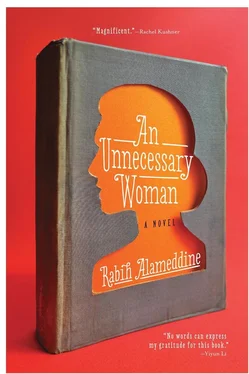I sit by the window. And while I sit
my youth comes back. Sometimes I’d smile. Or spit.
“I can wake her,” my great-niece says. “It’s not difficult to make her stop sleeping.”
I tell them, my sister-in-law and great-niece, that I don’t want to disturb her, or them either. I can wait for a while. I’ll be out of their way. I drag over a nearby high-backed chair and sit facing my mother, the window behind me. The few leaves on the ficus tree next to me are wilted and scorched, whether from lack of light, or of blessed watering, or of loving attention, I can’t tell. There doesn’t seem to be another potted plant in the apartment.
The armchair’s back faces the rest of the living room. You can watch television without having to be disturbed by the sight of my mother. She can stare out the window toward the world, but not toward her family. Maybe she’s the one who made the choice. Maybe she’s the one who wanted to keep looking out, not in.
There must be a word in some language that describes the anguish you experience upon suddenly coming face-to-face with your terrifying future. I can’t think of one in any of the languages I know.
Maybe it exists in Swahili or Sanskrit.
Maybe I can make one up, like Hamsun’s Kuboaa .
Maybe the word is just mother .
There is a word I know: litost . In Czech, according to Milan Kundera, litost is a state of agony and torment created by the sudden sight of one’s own misery.
The more I observe my mother, the more I think she looks like a Chekhovian character resting before a long journey, possibly a train trip, though God knows we no longer have passenger trains in Lebanon. Like a constipated creek in dry summer months, the drool of sleep flows leisurely and intermittently from the left corner of her slack mouth as her head falls southeasterly forward. Her breathing comes at me in jagged intervals, a whispery snore.
I don’t wish to be here. She’s contagious. My breathing becomes as serrated as hers.
There’s a milky gash in the dark chestnut coffee table next to her, a table that hasn’t felt the smooth pampering of a coat of varnish in at least a decade. On it, alongside an inopportune desk lamp, sits an old, round, ticktocking alarm clock with a spherical skullcap for a bell. But what captures my attention is another object on the table: a mother-of-pearl-encrusted music box, hand-sized, that I remember well from my childhood. I recall the day she bought it as a gift to herself.
I control my breathing because I feel a flood of emotions rising. I haven’t seen that music box since I was married off.
“ I begged of you, O Memory, / to be my best assistant, ” wrote Cavafy.
I assess my surroundings. My sister-in-law isn’t in the room. She’s making blustery, demented chopping noises in the kitchen, but her granddaughter spuds on the couch in front of the flickering television while banging the keys of an older-model laptop, studying me out of the corner of her eye. I must restrain myself.
My mother bought the music box because of its oddness; it had two twirling ballerinas, not just one, a pseudo-Sapphic pas de deux. It was Russian, or appeared so, and we all assumed the music it played was Russian too. It isn’t. I may not recall what I had for breakfast this morning or whether I had breakfast at all, but I can whistle that tune note for note, even though I probably haven’t opened the box in sixty years.
The twisted red coils of the heater in the far corner emit a steady electric hum that feels ominous in this situation. I begin to perspire again.
The tinny piano-imitating tune interred within the box is Chopin’s Waltz no. 2 in C-sharp Minor. I had forgotten all about this box, forgotten it even existed. I’d dismembered it in my memories. I’d disremembered it.
No wonder I was so easily infected. The Chopin virus was already latent in my system.
I desperately wish to sneak the Russian box into my handbag, but I resist my shameful urge. There are things I just won’t do, as much as I want to, if I intend to live decently with myself afterward.
I’ll listen to Rubinstein the Pole play the waltzes when I get home.
I distract myself by gazing at the barely perceptible steam rising off a damp pink sweater that’s draped over the top of the heater. The girl must have come in not long before I did, wet from the rain. She chews her gum loudly.
My mother used to call me a praying mantis (the term in Arabic translates to “prophet’s mare,” which is beautiful, if you ask me) because I was tall and scrawny. I think she meant a stick insect, but whether as a child or as a woman, I rarely disabused her of her incorrect assertions. Yet as I sit before her, I realize she’s much thinner than I ever was. She’s gone from Rubens to Schiele.
Many suggest that we close the circle as we age by growing childlike. The way she sits, folded upon herself, I’d go as far as to say that she’s shrinking to fetus form. Her appearance has changed as well, and I don’t mean just the intense reticulation of lines and wrinkles, the true stigmata of life. She wears someone else’s skin, someone much larger, a hand-me-down skin. A bluff of short spiky hairs sprouts on her upper lip, sparse Hitlerian. Her face is both gaunt and puffy; its muscles are completely slack. It has no discernible angles. My mother’s countenance has turned androgynous.
This is what I have to look forward to.
In slumber, my mother is melancholia in human form. I wonder, though, whether I only see this in her because I expect it. For all I know she may be dreaming of flowers and wheat fields, butterflies and Swiss Alps, chocolate and Chanel. Maybe that mind of hers is happy in its insanity. Devoid of worries and responsibility, of mundane earthly concerns, she may have reached Nirvana, without guru or Sherpa.
But the mournful words of Thomas Jefferson loop through my head. In a letter to a friend in 1825 he wrote, “All are dead, and ourselves left alone amidst a new generation whom we know not, and who know us not.”
Jefferson obviously had no Sherpa.
My mother wears a hearing aid that circles and penetrates her left ear, a recent addition but not a recent model. What seems at first to be the manufacturer’s logo behind her ear fails to sustain the illusion on closer inspection. It is formless Roman script in purple ink that reads, when I lean forward to see, AU SECOURS! I don’t have to wonder long who did this: as soon as I lean back in my chair, I notice the Kenzo potato blushing, avoiding eye contact by staring at a television commercial.
The slam of the front door distracts her. The density of the air changes faintly, allowing me to note how stale the room smells, a brew of ancient cigarette smoke, naphthalene, and armpit sweat. I worry that it’s my half brother the eldest, but a sloppy teenage boy walks in, a year or two older than the girl, who must be his sister. His eyes are covered by unattractive sunglasses that feature, incredibly, cheap-looking silver tassels behind each ear. He stops when he sees me. He stands with arms ceremoniously akimbo, directly in my line of sight.
“Who’re you?” he snaps, not maliciously, but with a certain air of privilege.
His sister shushes him, points toward my catatonic mother. I don’t reply. He shrugs with the honed nonchalance of ungracious adolescence, trudges with lazy steps into the kitchen. I’m sure his grandmother will explain who I am.
I, on the other hand, can’t explain who my mother is. Who is this woman before me? This thought drifts like smoke through my head: Do I know you?
I’ve been so busy thinking about how my mother saw me that I’ve had little sight left to look upon the grande dame, her holiness herself. This is my mother. I rack my brain. What do I know of her? What do I remember?
Читать дальше












